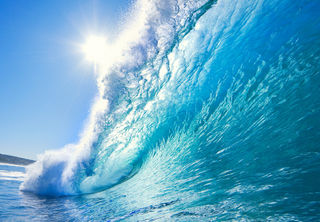OCD
Ruby Campbell’s Gift to the OCD Community
Swim forward to meet the waves.
Posted October 9, 2019 Reviewed by Jessica Schrader
As a writer, I know how challenging it can be to capture the experience of struggling with OCD. As a person who has the disorder, I also know when someone nails it. In the essay below that 17-year-old Ruby Campbell wrote for her high school English class, she does just that.
Ravaged by depression, anxiety, OCD, and suicidality—conditions severe enough to warrant hospitalization and then a stay at a residential program—Ruby emerged from treatment triumphant and ready to enjoy the life that was before her. Her essay brilliantly illustrates both how it feels to go into battle with the aggressive competitor that is OCD, and what it’s like to come out the other side victorious.
I wish I were introducing Ruby’s essay because it earned her a college scholarship or launched her advocacy career or landed her a book deal ... because those are all things that could have happened had she and her 14-year-old brother, Hart, not been killed by a drunk driver a few short months ago.
I am instead sharing it with you because my good friend, Jon Grayson, shared it with me in the aftermath of this horrible tragedy. He was her therapist, and her parents, Gail Lerner and Colin Campbell, gave him Ruby’s essay to read to his OCD support group, in which Ruby participated, and to offer to the OCD community at large.
Ruby’s inspirational words are a gift for anyone whose life has been touched by OCD, and it’s a privilege to share Ruby’s courage, wisdom, and insight with all of you.
----------
"Ocean" by Ruby Campbell
My feet smack the hot sand as I run forward, sea breeze whipping at my hair. The day is hot, and the sun is bright, not a cloud in the sky. The loose sand below my pounding feet changes form, transitioning from soft, dry powder to a densely packed, damp surface. The water pulls at my feet as I slow my pace, reaching a standstill in front of the cresting waves. They’re peaking high today, the larger breakers somewhere around 12 feet high. They’re some of the biggest I’ve ever seen.

I begin to walk again, luxuriating in the feeling of the water reach my ankles, my calves, my knees, until the waves are at my waist. In front of me are the monsters, the 12 footers, the massive walls of water that slam the sand with a fury. I continue forward, until I’m almost at the breakers. The thrill of anticipation and adrenaline spikes inside me, and I dive forward, slicing through the water as the first of the larger waves rumbles towards me.
I duck under it, feeling my head submerge for the first time and feeling the rush of the cool water around me. I come up on the other side and push forward.
Now, the water is colder, and I can sense the danger in the air. I can feel a lull in the waves as the water pulls back, so I swim forwards.
I am almost through the breakers, then I see a wave approaching. It’s far away, but already is a bump several feet high.
It’s going to be massive.
The wave has grown, and now is an immovable wall of water descending towards me. In this sense, the ocean and my anxiety are one and the same. Waves of water and emotion come crashing towards me, unstoppable. And so I do my best. I take a deep breath in preparation, and I dive to the ocean floor, digging my fingers into the sand and waiting for the wave to pass above me.
Most of the time, it works, but every now and then the wave is too powerful. It rips me away from the sand, dragging me across the ground and flipping me around and around. I tumble through the foam, unable to tell which way is up. When the world is nothing but darkness swirling around me, there is nothing I can do but curl up and hold my breath.
Waves come in sets of three, this I know, so the second I resurface, gasping for air, I’m on the lookout, scanning the sea for the next one. This one is larger than the first, more terrible, so I dive down again, desperately clutching at the seafloor. This wave pulls me up again, leaving no pretenses as to who is in charge. I’m whirled around and slammed against the hard-packed sand, mind and body battered. I’m under for longer this time, and I wonder what is more constricting: the water around me or the white of hospital walls.
Finally, I come up for air once again, strengthened by the oxygen rushing through my lungs. I wonder, will the next wave come? It feels both inevitable and impossible at the same time. If (when) it hits me, will I go under again? Will I struggle for air against the ancient rage of the sea?
Or will I swim fast and strong, slicing through the last wave to the place beyond the breakers? Will I float on my back under the summer sun and listen to the waves crash in the distance? This would be a peaceful life, a good life, and I will only have to brave one more wave.
I see it approaching, slowly building, and so I swim forward to meet it, the taste of salt on my tongue.
----------
Aaron Notestine, one of Ruby’s fellow groupmates, wrote after hearing her words, "This is her superpower. OCD is not in the words that she wrote, it is this thing between every word that takes everything away. There she is bursting through her OCD, experiencing everything, every sensation, from the anxiety to rising to the surface—a witness to her success and being.”
As we celebrate OCD Awareness Week (#OCDweek), October 13-19, 2019, let’s keep the memory of Ruby Campbell alive by remembering her approach to the ocean, to OCD, and to life. You, too, can burst through your OCD, experience everything, and witness your own success and being. And when you do, Ruby’s spirit will live on. It will live on in all of us every time we choose to swim forward to meet the waves.




